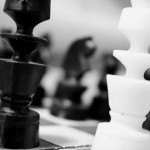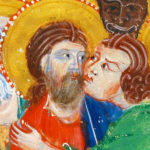We run our website the way we wished the whole internet worked: we provide high quality original content with no ads. We are funded solely by your direct support. Please consider supporting this project.
Scientific Support for the Open View
If a position is true, every avenue of reflection ought to point in its direction. What follows are two more “pointers” to the view that the future is at least partly open (indefinite, composed of possibilities). I’ll first consider an argument from quantum physics, followed by a pragmatic argument regarding what we ordinarily assume to be true in our actions.
Quantum physics suggests that Einstein was mistaken in his classical-philosophical conclusion that the distinction between the past, present and future is an illusion. Nothing short of an empirically groundless, metaphysically mechanistic assumption kept him, and some other physicists, from affirming that the apparent indeterminacy of reality at a quantum level is in fact real (viz. ontological).
But this means that time is real and thus that the “apparent” distinction between the past as a realm of definite realities and the future as a realm of indefinite probabilities is real. Prior to a “quantum event” (viz. the observed behavior of a quantum particle in an experimental situation) there is only a range (“wave packet”) of possibilities: during the quantum event the wave packet collapses down to one. After “the event” there is one definite outcome which could not have been predicted with certainty ahead of time.
If this is true of reality, it must be true of God’s knowledge of reality as well, for God’s omniscience is by definition exhaustive and perfectly accurate. In this view, the unpredictability of the future and the unchangeability of the past constitute two sides of the same metaphysical coin: they are both necessary facts. Scientist-theologian John Polkinghorne summarizes this well in his book Science and Providence when he notes that considerations of the role of indeterminacy in quantum physics
…emphasize how different time is from space [and] how seriously we must take its unfolding as a process of genuine becoming. The future is not already formed ahead of us, waiting to reveal itself to our exploration, as the fixed contours of a valley reveal themselves to the traveler who makes his ways through them. The future is in part our creation: its shape is responsive to our molding, as the clay is formed by the sculptor to create his irreducibly new thing, which is his work of art. If even the omnipotent God cannot act to change the past, it does not seem any more conceivable that the omniscient God can know with certainty the unformed future.
It could be argued that science is forever changing and thus what seems like a certain conclusion today might be revised by new discoveries tomorrow. True enough. Too much should not be wagered on the vicissitudes of scientific discovery. At the same time, we can’t ignore the findings of science on this account. At the very least, any who would want to continue to hold to the eternal definiteness of the future (in the mind of God) and thus to the non-ontological nature of quantum indeterminacy must now bear the scientific burden of proof.
The contemporary quantum physical paradigm of reality is reinforced by our common experience. Indeed, I would argue that the complementarity of determinacy and indeterminacy is a metaphysical principle, and thus is universally instantiated. Every event seems to exemplify it. From quantum particles to molecular structures and from the behavior of single-celled organisms to the spontaneous movements of insects, birds and mammals, including human beings, we find a dimension of individual indeterminacy within a broader parameter of determinacy. Sociology has taught us, for example, that group behavior is remarkably predictable, though the behavior of any individual within a group is not. So it is with most animal behavior.
This suggests that the indeterminacy we observe in quantum physics is not illusory: it is ontological. As humans, we assume this conclusion in all our behavior. Philosophical or theological determinists may believe that reality is exhaustively predetermined, but they cannot consistently behave according to this conviction. We all must live as if the future (in contrast to the past) is partly indefinite and partly definite. Exhaustive determinism (as well as exhaustive indeterminism) are both unlivable doctrines.
More specifically, every self-determining decision we make assumes that we believe things really hang upon what we do. But every self-determining decision we make also presupposes that many if not most things about tomorrow are fixed. We assume, for example, that the laws of nature shall not change. The earth and sun shall remain roughly the same tomorrow as they were today. The character of people I know shall remain more or less the same tomorrow as it is today, etc.
Thus, if the future was totally fixed, we could not think and act in a self-determining fashion. If the future was totally open, however, we again could not think and act in a self-determining fashion. Yet we do think and act in a self-determining fashion. Hence we evidently assume that the future is in reality partly indefinite and partly definite. And in doing so, I argue, we are simply acting consistently with the truth about everything insofar as we can know it. Determinacy and indeterminacy are complementary principles.
When on top of all this we discover that there are scriptural and philosophical reasons for accepting the indefiniteness of the future as ontological, the case for the open future grows all the stronger.
Note: I am currently working with several others on a book entitled The Cosmic Dance that will show how several scientific disciplines suggest that time and indeterminacy are real. The book will discuss neuroscience, quantum physics, chaos and complexity theory, non-equillibrium thermo-dynamics (systems theory) and relativity theory. It will hopefully be published in 2009.
Category: Essays
Tags: Essay, Open Theism
Topics: Defending the Open View
Related Reading

What is the significance of Exodus 3:18–4:9?
The Lord tells Moses that the elders of Israel will heed his voice (vs. 18). Moses says, “suppose they do not believe me or listen to me…” (4:1). God performs a miracle “so that they may believe that the Lord…has appeared to you” (vs. 5). Moses remains unconvinced so the Lord performs a second miracle…

An Omni-Resourceful God
It is quite common for us to talk about the attributes of God as omnipotent (all-powerful), omniscient (all-knowing) and omni-present (present everywhere), but what about God’s unlimited resourcefulness? Consider the story of Moses’ commission in Exodus 3 and 4. Here the Lord instructs Moses to tell the elders of Israel that the Lord has heard…

Did God Predestine Judas to Betray Jesus? (podcast)
Greg talks about the role Judas played in the crucifixion of Jesus and speculates about his potential for good. Episode 516 http://traffic.libsyn.com/askgregboyd/Episode_0516.mp3

The Cross in the Mirror
For those who are just tuning in, we are in the midst of a series that is fleshing out the theology of The ReKnew Manifesto. So far I’ve argued that the cross is the definitive revelation of God and that it should therefore be the centerpiece of our hermeneutic (interpretation of the Bible) as well…

How do you respond to the book of Revelation?
“The revelation of Jesus Christ, which God gave him to show his servants what must soon take place…” (1:1). Because many modern evangelical readers consider almost everything in the book of Revelation to be a sort of “snap shot” about what shall occur at the end of history, it will prove more beneficial to deal…

Open Theism Timeline
Open Theism Timeline by Tom Lukashow An argument that is frequently raised against the open view is that it is a recent innovation. Paul Eddy had discovered Calcidius, a fifth century advocate, and I and others knew of L.D. McCabe and Billy Hibbard, two 19th century advocates. But that was about it – until I…
